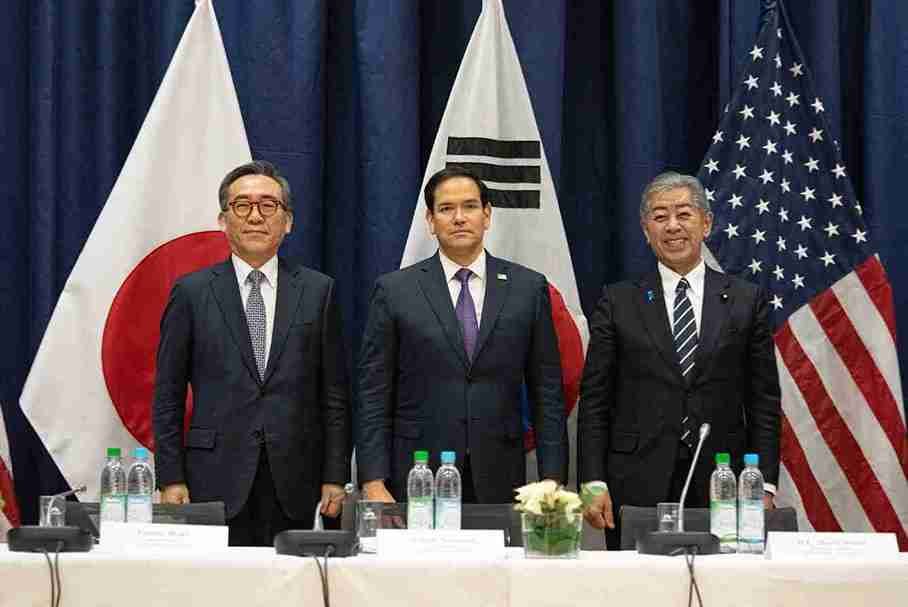The US Secretary of State Marco Rubio, Japanese Foreign Minister Iwaya Takeshi, and South Korean Foreign Minister Cho Tae-yul convened on February 15 in Munich to reinforce the enduring trilateral partnership among their nations. The meeting underscored their collective commitment to ensuring the safety, security, and prosperity of the United States, Japan, and South Korea, as well as the broader Indo-Pacific region.
Strengthening Security Cooperation
The leaders emphasized the critical need to enhance their military alliances to maintain peace and prosperity in the region. They reaffirmed their dedication to bolstering defense and deterrence strategies, which include conducting joint military exercises and enhancing the capabilities of their respective armed forces.
The United States reiterated its unwavering commitment to the defense of both Japan and South Korea, supported by its formidable military strength, including nuclear capabilities.
The trio expressed strong opposition to any unilateral attempts to alter the status quo in the Indo-Pacific, particularly in the South China Sea. They reaffirmed their commitment to a free and open Indo-Pacific, emphasizing the importance of upholding international law.
Additionally, they highlighted the necessity of maintaining peace and stability across the Taiwan Strait, advocating for the peaceful resolution of cross-Strait issues and supporting Taiwan’s meaningful participation in international organizations.
Addressing North Korean Threats
The meeting also focused on the persistent threat posed by North Korea. The leaders reiterated their commitment to the complete denuclearization of the Democratic People’s Republic of Korea (DPRK) in line with United Nations Security Council Resolutions.
They expressed serious concerns regarding North Korea’s nuclear and missile programs, cyber activities, and increasing military cooperation with Russia. The trio issued a stern warning against any provocations or threats to their nations, pledging to enhance trilateral coordination at all levels.
The leaders condemned the ongoing human rights violations in North Korea and committed to strengthening the international sanctions regime against the DPRK. They emphasized the need to respond firmly to violations of UNSCRs and to apply pressure on Pyongyang to cease illicit activities that fund its nuclear ambitions.
Furthermore, they pledged to address humanitarian issues, including the resolution of abductee cases and the plight of separated families.
Economic Security
In addition to security matters, the leaders announced plans to bolster economic cooperation, particularly in energy security. They aim to leverage the United States’ reliable energy resources and enhance collaboration in liquefied natural gas.
The leaders welcomed initiatives to diversify critical mineral supply chains and to develop advanced nuclear reactor technologies.
Recognizing the importance of technological advancement for regional security and economic prosperity, the trio committed to closer cooperation in critical and emerging technologies.
This includes collaboration in artificial intelligence, semiconductors, quantum science, cybersecurity, biotechnology, and digital communications infrastructure.
They also pledged to strengthen research collaboration among their national laboratories to secure vital supply chains and enhance economic resilience.
The leaders reaffirmed their commitment to a fair global economic order, standing against economic coercion and unfair trade practices. They pledged to strengthen economic partnerships that benefit the citizens and businesses of their nations.
Shared Values and Regional Engagement
The meeting concluded with a commitment to uphold shared democratic values and principles. The leaders welcomed South Korea’s upcoming hosting of the Asia-Pacific Economic Cooperation (APEC) summit in 2025 and expressed their intent to work collaboratively to achieve meaningful outcomes.
They reaffirmed their dedication to principles such as democracy, sovereignty, and the rule of law, and committed to strengthening ties with like-minded partners to defend these values.
The Secretary and Foreign Ministers made it clear that they stand united against any efforts to destabilize democratic institutions, economic independence, and global security.
This trilateral meeting in Munich marks a significant step in reinforcing the alliance among the United States, Japan, and South Korea, as they navigate the complex security landscape of the Indo-Pacific region.








